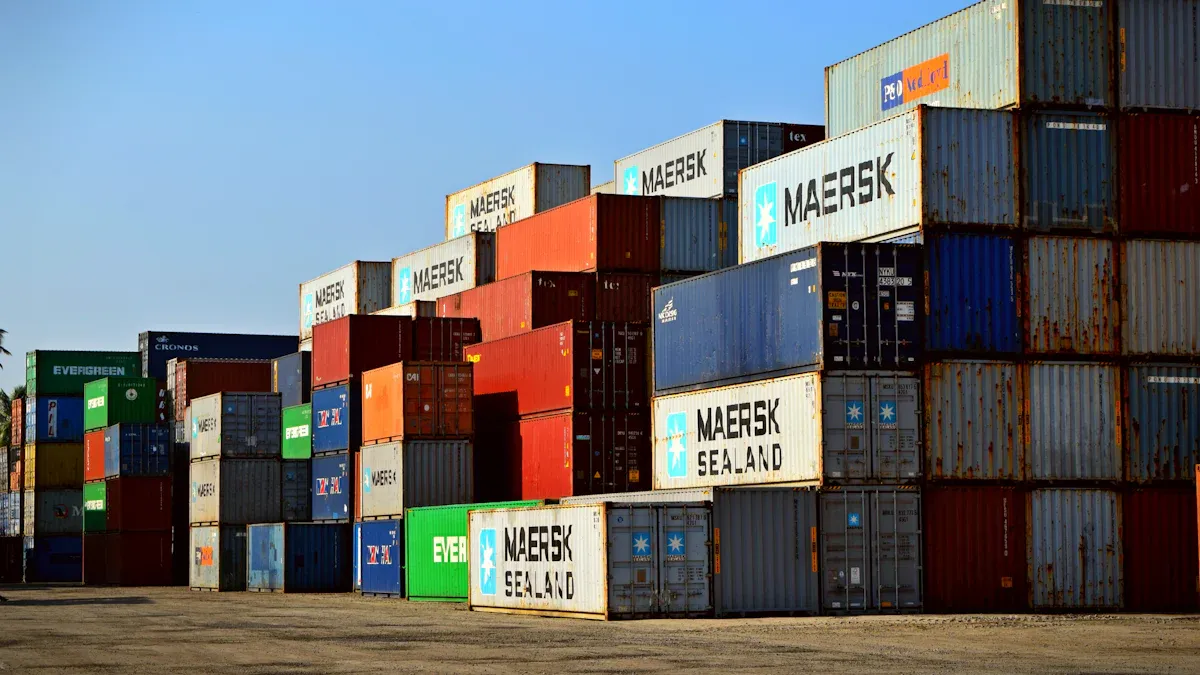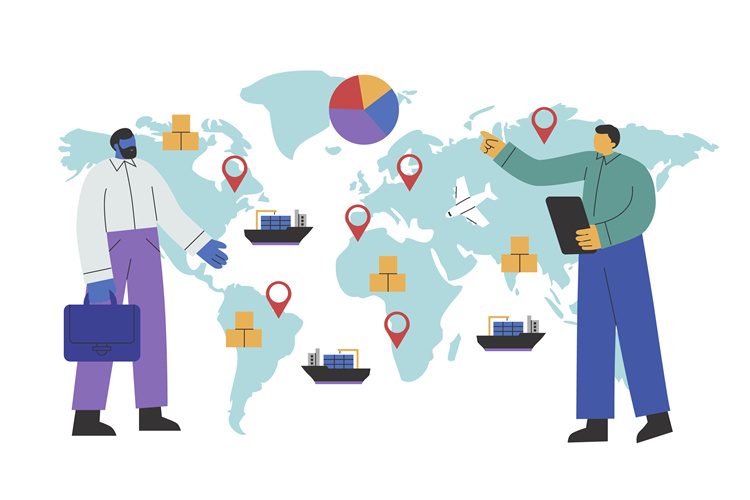Key Criteria for Choosing Logistics Partners: A Comprehensive Evaluation Framework

When you start Choosing Logistics Partner, you should look for multimodal capabilities, smart technology, strong compliance, and financial stability. You need a provider who can keep up with new tariffs and changing regulations. Many companies now want partners who can adapt quickly to supply chain disruptions.
Logistics Partner Response | Service/Strategy Description | |
|---|---|---|
Increased tariffs | Trade and customs consulting | Helps you lower risks and find savings globally. |
Supply chain disruptions | Integrated logistics services | Offers flexible shipping, warehousing, and delivery. |
Cost mitigation | Technology and carrier neutrality | Uses smart systems to pick the best route and carrier. |
JUSDA stands out as a reliable choice. The company uses advanced technology and has a global network to help you meet these challenges. Providers like JUSDA update their services, train staff, and build strong digital systems to handle compliance and sudden changes.
Key Takeaways
Look for a logistics partner with strong multimodal capabilities to ensure flexible and reliable shipping across road, rail, air, and sea.
Choose a provider that uses advanced technology like real-time tracking, AI, and automation to improve efficiency and visibility.
Assess your business needs carefully, including order volume, product types, and special handling, to find a partner that fits your current and future demands.
Evaluate providers based on experience, reputation, compliance, financial stability, and sustainability to reduce risks and support growth.
Plan a clear onboarding process with your chosen partner to ensure smooth integration, avoid delays, and maintain strong communication.
Business Needs

Operations Assessment
You need to start by understanding your current logistics operations. Look at how your business moves products, manages inventory, and handles customer orders. Ask yourself these questions:
How many orders do you process each day?
What types of products do you ship?
Where are your customers located?
Do you need special handling, such as temperature control or hazardous goods management?
You should also review your technology systems. Many businesses use tools like Transportation Management Systems (TMS) or real-time tracking to improve visibility and speed. If you already use these systems, make sure your logistics partner can integrate with them. This helps you keep track of shipments and inventory in real time.
A strong logistics partner will offer flexible transportation options. You might need truckload, less-than-truckload, or expedited services. Providers with warehouse automation, such as robots or drones, can help you increase accuracy and productivity. These features are important if your business faces sudden changes in demand or needs to scale quickly.
Tip: Companies with diversified supply chains recover faster from disruptions. You can reduce risks by working with partners who offer multiple shipping routes and regional hubs.
Service Requirements
Your service requirements depend on your business size and industry. Small businesses often need flexible, cost-effective solutions. Large enterprises look for advanced automation and comprehensive supply chain management. The table below shows the main differences:
Requirement | Small Business Needs | Large Enterprise Needs |
|---|---|---|
Flexibility | High (adapts to order volume changes) | Moderate (handles steady high volume) |
Technology | Easy integration with ecommerce platforms | Advanced automation and analytics |
Cost Structure | Focus on cost efficiency | Investment in infrastructure |
Customization | Tailored services, value-added options | Standardized, scalable solutions |
Communication | Direct, frequent updates | Systematic, automated reporting |
You should also consider industry-specific needs. For example, medical or food businesses may require strict compliance and temperature control. Many logistics providers now offer green packaging and sustainable sourcing, which can help you meet consumer expectations and build your brand reputation.
Logistics partners align with your needs by:
Offering diverse transportation and warehousing services.
Ensuring compliance with trade and environmental regulations.
Providing real-time tracking and analytics.
Supporting social and environmental goals, such as waste reduction and fair labor practices.
Choosing the right partner starts with knowing what your business needs today and what it might need as you grow.
Key Factors
Experience & Reputation
You want a logistics partner with a strong track record. Experience and reputation show how well a provider can handle challenges and deliver results. Industry benchmarks help you compare providers. Experts use lists of service capabilities and surveys to classify logistics companies by their performance. You can look at these benchmarks to see which providers stand out.
Providers with high ratings often have:
Years of experience in the field.
Positive reviews from clients.
Recognition for service quality and reliability.
Membership in industry associations.
You should also check for awards and certifications. These show that a provider meets high standards. JUSDA, for example, has built a reputation for innovation and reliability across many industries. Their commitment to excellence makes them a trusted choice.
Tip: Use multi-criteria decision-making tools to compare cost, relationship, services, and quality when evaluating providers.
Multimodal Capabilities
Multimodal logistics means using different types of transportation—like road, rail, air, and sea—to move goods. You need a partner who can switch between modes quickly when problems arise. Providers show their multimodal strength by using advanced Transportation Management Systems (TMS). These systems let you book, track, and manage shipments across all modes in one place.
Key features of strong multimodal providers:
Real-time data and event monitoring.
Centralized booking and shipment management.
Direct data-sharing among carriers and teams.
Automated auditing and cost controls.
Integration with your business systems.
JUSDA’s 8 Core Products cover all major transport modes. Their network supports seamless switching between road, rail, air, and ocean. This flexibility helps you avoid delays and keep your supply chain running smoothly.
Technology & Data
Technology drives modern logistics. You need a partner who uses the latest tools to improve speed, accuracy, and visibility. Leading companies use robotics, blockchain, artificial intelligence, and IoT sensors to automate tasks and track shipments.
Technology | Description | Benefit |
|---|---|---|
Robotics and Automation | Automates picking, sorting, packing, and delivery. | Increases efficiency and reduces errors. |
Blockchain | Creates secure, traceable supply chain records. | Speeds up customs clearance and reduces paperwork. |
Artificial Intelligence | Improves forecasting, route planning, and customer service. | Cuts costs and boosts satisfaction. |
IoT Sensors | Monitors goods and conditions in real time. | Prevents spoilage and improves tracking. |
Transportation Management | Plans routes, selects carriers, and tracks shipments. | Optimizes costs and delivery times. |
Data Analytics | Analyzes data for better inventory and demand planning. | Prevents stockouts and reduces waste. |
Cloud Logistics | Supports flexible, scalable operations with real-time data. | Enables fast decisions and easy integration. |
JUSDA’s JusLink intelligent supply chain platform uses IoT, cloud computing, and big data. You get real-time collaboration and information sharing, which helps you make better decisions.
Scalability & Flexibility
Your business needs may change quickly. You want a logistics partner who can grow with you and adapt to new demands. Scalability means handling more orders or expanding to new markets without problems. Flexibility means adjusting services to fit your needs.
Signs of scalable and flexible providers:
Large network of warehouses and service points.
Ability to add or reduce capacity fast.
Customizable solutions for different industries.
Quick response to market changes.
JUSDA offers over 155 service points and more than 2,500,000 square meters of warehouse space. Their solutions fit small businesses and large enterprises alike. You can rely on them to support your growth.
Compliance & Safety
Safety and compliance protect your business from risks. You need a partner who follows all rules and keeps your goods safe. Providers with high safety scores show strong regulatory adherence and risk management. They conduct audits, appoint compliance officers, and use technology to automate checks.
What to look for:
Dedicated compliance staff.
Risk management frameworks.
Automated compliance documentation.
Certifications for safety and data protection.
JUSDA’s refined supplier management and strict compliance practices set a high standard. They ensure your shipments meet all legal and safety requirements.
Note: Compliance with regulations like GDPR and SOC builds trust and reduces legal risks.
Financial Stability
Financial stability means your logistics partner can weather tough times. You want a provider with strong financial indicators. Look for low operating ratios, healthy net profit margins, and efficient inventory turnover.
Key financial indicators:
Operating Ratio: Lower is better.
Net Profit Ratio: Shows profitability.
Financial Leverage: Lower risk with less debt.
Inventory to Sales Ratio: Indicates ability to manage stock.
Inventory Turnover: High turnover means good liquidity.
You should also check credit reports, licenses, and industry rankings. Providers with a diverse customer base and many years in business are more resilient. JUSDA’s global network and long history show their stability.
Sustainability
Sustainability matters more than ever. You want a partner who uses green practices to reduce waste and emissions. Providers use energy-efficient lighting, smart HVAC systems, and renewable energy in warehouses. They choose eco-friendly packaging and upgrade fleets to electric or hybrid vehicles.
Sustainability Focus Area | Data-Driven Approach | Business Impact |
|---|---|---|
Uses real-time data to plan efficient routes. | Lowers emissions and fuel costs. | |
Vehicle Selection | Picks fuel-efficient vehicles using performance data. | Reduces costs and pollution. |
Predictive Maintenance | Uses sensors to prevent breakdowns. | Cuts delays and emissions. |
Fleet Management | Matches vehicle use to demand. | Saves resources and boosts asset returns. |
Load Balancing | Improves load ratios with data. | Reduces empty miles and fuel use. |
Container Mapping | Matches cargo to space and routes. | Cuts costs and carbon footprint. |
JUSDA measures and reports sustainability using global standards like the GLEC Framework and ISO 14083. Their solutions help you meet environmental goals and build a responsible brand.
JUSDA’s 8 Core Products address all these key factors. You get multimodal transport, advanced technology, strong compliance, financial stability, and sustainable practices. Their tailored solutions fit diverse industries, making them a benchmark for logistics excellence.
Provider Comparison

Research & Reviews
When you start comparing logistics providers, you should look at both expert reviews and customer feedback. Reviews help you see how each provider performs in real situations. You can also use third-party reports to compare core services, technology, and industry focus. The table below shows how top providers differ:
Provider | Core Services & Specialization | Industry Focus | Technology & Integrations | Geographic Coverage & Warehouses | Customer Focus & Unique Strengths |
|---|---|---|---|---|---|
Buske Logistics | Warehousing, sequencing, food & beverage, automotive, aerospace | Food & Beverage, Automotive, Retail, Healthcare | Advanced WMS, customizable ERP integrations | 35+ warehouses in US & Canada, FDA-approved | B2B & B2C, scalable solutions, transparent pricing, JIT & VMI expertise |
DHL Supply Chain | Warehousing, transportation, packaging, returns management | Global industries | Custom APIs, e-commerce platform integrations | 500+ warehouses globally | Global logistics needs, robust customer support |
Red Stag Fulfillment | E-commerce fulfillment for heavy, bulky, high-value products | E-commerce (heavy/bulky goods) | Integrates with 50+ e-commerce platforms | 2 warehouses centrally located in US | Fast, accurate fulfillment, shrinkage reduction, proactive service |
Cardinal Health | Warehousing, contract storage, order fulfillment | Healthcare, pharmaceuticals | N/A | North America | Regulated environment compliance, healthcare logistics |
UPS Supply Chain | Parcel services, warehousing, freight, supply chain management | Broad, global | Proprietary logistics systems, WMS, ERP | 100+ warehouses globally | Complex, high-volume shipping, global support |
Penske Logistics | Dedicated contract carriage, freight management, warehousing | Automotive, food & beverage, retail, healthcare | Proprietary TMS, real-time freight visibility | 370+ locations in North America & select international markets | Tailored transportation, operational excellence |
You should also check for certifications, security measures, and transparent communication. These steps help you find a provider who matches your needs.
Case Studies & References
You can learn a lot from real-world examples. Many companies share case studies that show how logistics partners solve problems. For example:
Company | Industry Challenge | Logistics Partnership Strategy and Outcome |
|---|---|---|
UPS | Healthcare logistics during COVID-19 | Adapted logistics strategy to support medical goods shipping, showing agility and sector-specific focus. |
XPO Logistics | Demand fluctuations and capacity management | Built long-term relationships with flexible contracts and outsourcing to balance demand changes. |
FedEx | Balancing flexibility and efficiency | Refined pricing models and kept control to respond quickly while staying efficient. |
DHL | Personnel and equipment management | Outsourced logistics to cut costs and tailored solutions for different industries. |
DSV | Technology adoption and automation | Used automation and modernized operations to improve efficiency and adapt to new trends. |
Tip: Ask providers for references or case studies in your industry. This helps you see how they handle challenges like yours.
Proposals & Quotes
When you review proposals and quotes, you should look beyond price. Key factors to compare include:
Seller and buyer information accuracy
Incoterms and delivery place
Ports of loading and discharge
Product details and shipment type
Lead time and delivery schedules
Payment terms and bank details
Technical specifications and compliance
Service levels and scalability
Transportation mode expertise
You should also request a detailed cost breakdown. Watch for extra fees like setup, storage, or returns processing. Use a comparison table to rate each provider on cost, service, technology, and industry expertise. This structured approach helps you choose the best logistics partner for your business.
Choosing Logistics Partner
Final Evaluation
When you reach the final stage of Choosing Logistics Partner, you need to use both numbers and personal judgment. You want to make sure your choice fits your business goals and can handle future growth. Start by looking at these important criteria:
Years of operation and experience in your industry
Warehousing and distribution capabilities
Transportation management efficiency
Technology solutions, such as real-time tracking and ERP integration
Cybersecurity measures
Transparent pricing models and cost analysis, including hidden costs
Scalability and flexibility for growth and seasonal changes
You should also think about qualities that are harder to measure:
Customer service and quick communication
Dedicated account managers with expertise
Trust, collaboration, and cultural fit
Many companies use scoring templates based on key performance indicators (KPIs) and service level agreements (SLAs). You can involve teams from different departments to get a full picture. Site visits and meetings help you see how the provider works and if they match your company’s style.
Tip: Use JUSDA as a benchmark when Choosing Logistics Partner. JUSDA’s multimodal capabilities, advanced technology, and strong compliance set a high standard for comparison.
A table can help you organize your evaluation:
Criteria | Score (1-5) | Notes |
|---|---|---|
Industry Experience | ||
Warehousing & Distribution | ||
Technology & Integration | ||
Pricing Transparency | ||
Scalability & Flexibility | ||
Customer Service | ||
Cultural Fit |
Fill in the scores and notes for each provider. This makes Choosing Logistics Partner easier and more objective.
Onboarding Plan
After you select your logistics partner, you need a strong onboarding plan. This step helps you avoid delays and lost revenue. Many companies face challenges like slow onboarding, poor integration, and miscommunication. You can prevent these problems by following best practices.
Start with clear steps:
Define your fulfillment needs, such as order volume, warehouse locations, inventory management, and packing rules.
Review pricing structures and contract terms. Watch for hidden fees and automatic renewals.
Document all promises made during sales talks, like extra storage or performance guarantees, in the contract.
Build a transition team with your operations leaders, a project manager, the logistics partner’s account manager, and product suppliers.
Work with suppliers to reroute orders and follow the new partner’s receiving requirements. Check if value-added services can be handled more efficiently.
Plan for system integration. Make sure your systems work with the logistics partner’s technology.
You should also:
Decide if onboarding involves a new or existing warehouse location.
Keep communication open and frequent to address changes quickly.
Set up a process for solving issues. Log problems, investigate, involve the right people, and find solutions together.
Common challenges include:
Incomplete documentation and bottlenecks
Complex compliance requirements
Unclear roles and responsibilities
Not enough training and support
Unclear timelines and deliverables
Note: Onboarding can take from one week to over a month. Delays can lead to missed revenue and supply chain disruptions. Good planning and teamwork help you start strong.
When Choosing Logistics Partner, use JUSDA’s onboarding process as a model. Their clear communication, technology integration, and dedicated support team help clients avoid common pitfalls and start operations quickly.
JUSDA Solutions
Brand Overview
You need a logistics partner with a strong global network and advanced technology. JUSDA stands out because it does more than just move goods. The company builds flexible routes, such as direct trucking and rail combined with short-sea shipping. JUSDA covers not only China but also Southeast Asia, North America, and Europe. You benefit from their ability to adapt quickly when market conditions change or shipment surges happen.
JUSDA keeps operations ready, even during tough times. The company offers reliable alternatives when infrastructure is limited, like direct truck transport with customs support for fast delivery. JUSDA has offices in over 20 countries, so you get broad coverage and local expertise. You can track your shipments in real time using WeShip Track, which sends updates by email and WhatsApp. This system helps you know where your goods are and reduces questions about order status.
JUSDA focuses on high-value industries, including electronics, automotive, and medical equipment. You get tailored solutions instead of a one-size-fits-all approach. The JusLink Smart Supply Chain Management Platform uses RFID, automation, and analytics to give you accurate and fast service.
JUSDA’s local strategies in North America, Vietnam, and India help you meet regional needs and government requirements. You get better response times and seamless integration with your supply chain.
8 Core Products
JUSDA’s 8 core products help you solve modern logistics challenges. You get real-time inventory tracking, efficient transportation, and smart technology. These products use AI, IoT, cloud computing, and automation to improve forecasting, inventory management, and route planning. You can also meet sustainability goals with eco-friendly packaging and fuel-efficient routes.
JUSDA Core Product / Technology | How It Helps You |
|---|---|
eVMI and JusLink | Track inventory in real time and avoid delays. |
IoT and Big Data | Get instant updates and control your supply chain. |
Automation | Reduce errors and save time in warehouses. |
Cloud-based Systems | Keep data secure and manage documents easily. |
AI and Machine Learning | Predict demand and speed up deliveries. |
Cleanroom Services | Protect products and meet safety standards. |
Supply Chain Flexibility | Adapt quickly to disruptions and keep operations running. |
Packing, Labeling, Organizing | Streamline logistics and focus on growing your business. |
JUSDA’s solutions fit many industries and help you stay ahead in a changing world. You get technology, flexibility, and sustainability all in one package.

JUSDA Solutions
To provide you with professional solutions and quotations.
Choosing Logistics Partner with a structured, criteria-based approach gives you clear benefits. You can use scorecards and dashboards to track performance, reduce costs, and improve service. Regular assessments help you spot gaps, boost efficiency, and support growth.
Identify improvement opportunities
Enhance customer satisfaction
Reduce operational costs
Consider reviewing your current logistics setup and explore innovative partners like JUSDA to strengthen your supply chain.
FAQ
What is the most important factor when choosing a logistics partner?
You should look for a partner with strong multimodal capabilities. This means they can move your goods by road, rail, air, or sea. Flexibility helps you avoid delays and keep your supply chain running.
How does technology improve logistics services?
Technology gives you real-time tracking, better route planning, and faster problem-solving. You can see where your goods are at any time. Smart systems help you save money and avoid mistakes.
Why is compliance important in logistics?
Compliance keeps your shipments safe and legal. You avoid fines and delays when your partner follows all rules. Good compliance also builds trust with your customers and business partners.
How does JUSDA support sustainability in logistics?
JUSDA uses green packaging, fuel-efficient vehicles, and smart route planning. You can lower your carbon footprint and meet your company’s environmental goals with their solutions.
Can JUSDA handle special industry needs?
Industry | JUSDA Solution Example |
|---|---|
Electronics | Secure, climate-controlled shipping |
Automotive | Just-in-time delivery |
Medical Health | Cleanroom and compliance services |
You get tailored services for your industry’s unique needs.
See Also
Mastering Efficient Logistics Strategies In Advanced Manufacturing
Comprehensive Insights Into Leading Worldwide Logistics Providers
Effective Methods To Reduce Costs In Logistics Operations
Unlocking Supply Chain Savings Through Expert Logistics Tips
How Innovations Are Transforming Modern Supply Chain Logistics
